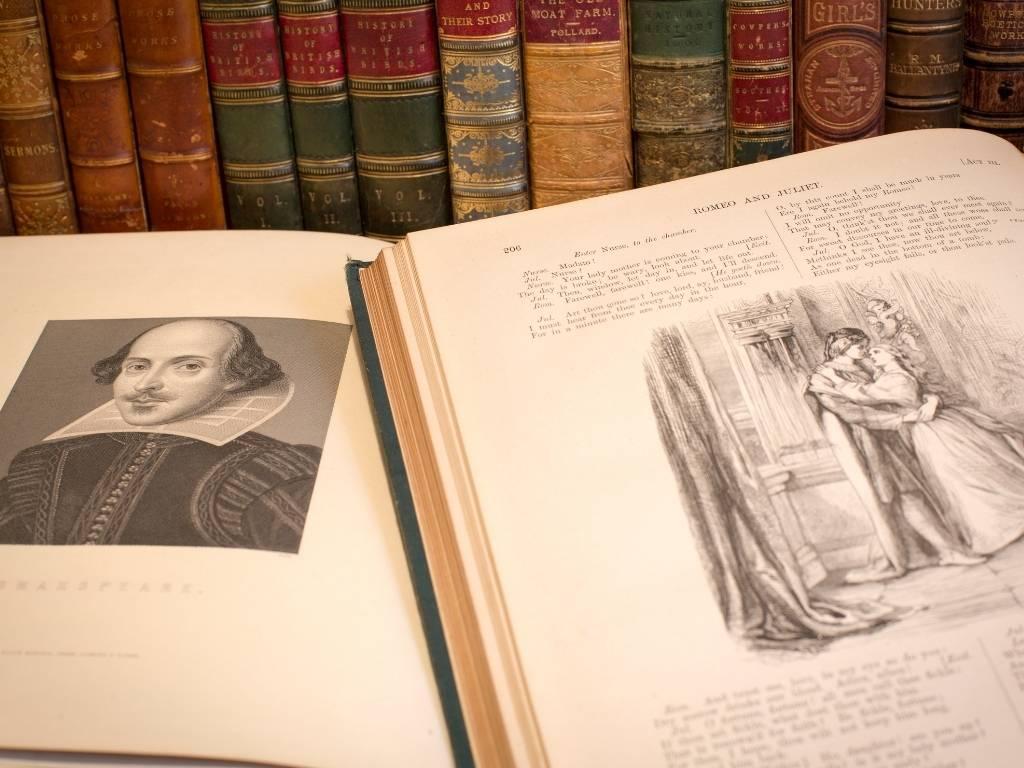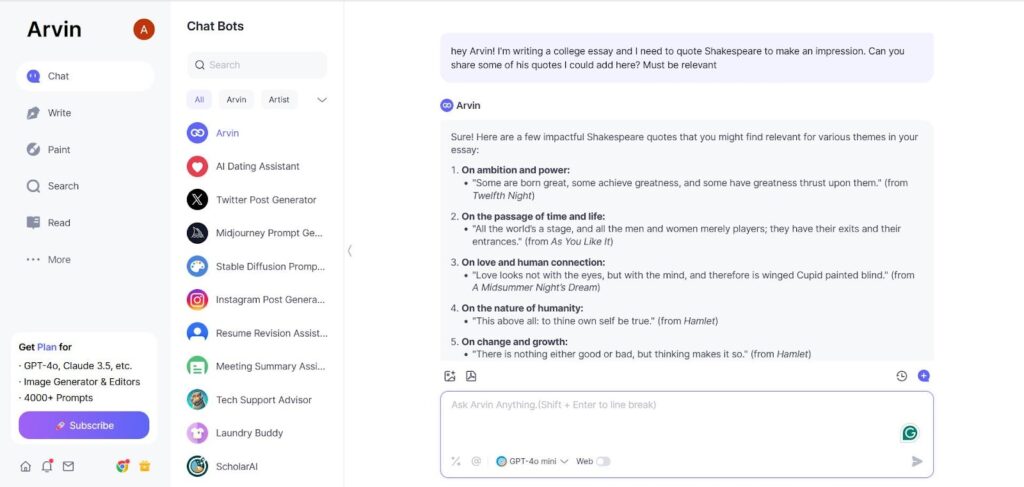Did you know that Shakespeare invented over 1,700 words we still use today? Without him, we might not have words like swagger, bedazzled, or even gossip. Cool, right? But here’s the thing: knowing how to quote Shakespeare is more than just about throwing around fancy phrases. After all, he is THE WILLIAM SHAKESPEARE, known by millions in the world!
But don’t you worry! Whether you’re trying to impress your teacher, write the perfect Insta caption, or just want to drop a dramatic line in a conversation, this guide is here to help. We’ll break it all down step by step, so by the end, you’ll know exactly how to quote Shakespeare like a total pro. Ready? Let’s dive in!

Why You Should Know How To Quote Shakespeare?
Okay, let’s be real: Why should you even bother quoting Shakespeare? Sure, the guys did have some of the best poem ideas, but it’s not like we’re living in the 1600s. The era may be modern, but the truth is that his words are still everywhere. Whether you want to sound extra smart, impress someone with a clever line, or just add some drama to your conversations, knowing how to quote Shakespeare will always come in handy. Here are a few reasons why you might need Shakespeare’s help:
Shakespeare Says It Better
Ever feel like you’re trying to explain something, and no matter how hard you try, it just doesn’t come out right? Shakespeare doesn’t have that problem. The guy was a genius at putting big poem ideas into just a few words.
Take this gem for example:
“All the world’s a stage” (As You Like It). It’s such a simple way to say, “Life is basically one big performance.”
He had a knack for making things sound way more profound than we could ever manage. So why not borrow some of his brilliance when you need it?
Because It Makes You Look Cool
Let’s be honest: quoting Shakespeare makes you sound smart, cultured, and just a little mysterious. Even if people don’t know the exact play or meaning, they’ll probably recognize the quote. Lines like “To be or not to be” are basically part of pop culture at this point.
And hey, quoting Shakespeare isn’t just about sounding smart. It’s about showing you appreciate timeless stuff. Plus, it’s a great way to stand out in conversations or even on social media.

How to Quote Shakespeare Like a Pro
Quoting Shakespeare might sound intimidating at first, but it’s actually easier than you think. Let’s break it down for you:
Get the Formatting Right
Formatting is key when quoting Shakespeare or any other author, for that matter. It helps your quote look clean and professional. Here’s what you need to know:
Short Quotes (Under Four Lines)
For short quotes, just put the quote in quotation marks and include the play, act, scene, and line numbers in parentheses. Here’s an example:
- “Love looks not with the eyes, but with the mind” (A Midsummer Night’s Dream 1.1.234).
It’s simple, direct, and easy to follow.
Long Quotes (More Than Four Lines)
For longer quotes, you’ll use a block quote. This means indenting the text and not using quotation marks. Keep the original line breaks exactly as they are. For example:
“If music be the food of love, play on;
Give me excess of it, that, surfeiting,
The appetite may sicken and so die.”
(Twelfth Night 1.1.1-3)
This format makes sure your longer quotes stand out and are easy to read. Plus, isn’t it such a nice quote for anniversary love letters?
Keep The Original Language
One of the things that makes Shakespeare’s writing special is the way he uses language. When you quote him, try to keep his original words intact. That means you shouldn’t change “thou” to “you” or “art” to “are.” It might feel easier, but you’ll lose some of the magic of his words.
For example, “To be, or not to be” wouldn’t have the same impact if it were written as “Should I live, or should I die?” See how the original phrasing adds weight to the meaning, and that’s what makes his quotes so powerful. You don’t want to lose that impact!

Understand Your Audience
How to quote Shakespeare also depends on your audience. Some quotes are more suitable for formal settings, while others are better for casual conversations. Here’s how it usually goes:
- Formal Settings (Essays, Presentations): If you’re in a formal setting, use quotes that are serious and thoughtful. For example,
“Uneasy lies the head that wears a crown” (Henry IV, Part 2) is a great choice when discussing leadership or responsibility.
- Casual Settings (Everyday Conversations, Social Media): When you’re in a casual setting, choose quotes that are lighter or more relatable. For example:
“Though she be but little, she is fierce” (A Midsummer Night’s Dream) is perfect for describing someone strong and determined, even if they seem small.
Here’s A Cheatsheet:
Picking the right quote for the right moment will help your message resonate better with your audience. Now, you might be thinking, “How am I going to remember all these quotes and find the right one at the right time?”
We know you’re no Shakespeare (no offense, though), so we have something that will help you find the right quote at the right time. Meet Arvin AI, an AI writing assistant powered by GPT-4o, and see how it’s going to help you find the perfect quote in just a few seconds.

Add Some Context
Shakespeare’s quotes can be powerful, but they might confuse people if they don’t know where they come from. So, when you quote Shakespeare, it’s helpful to give a little context. For example, you might explain where the quote is from or what the character is talking about.
For instance, if you’re using the famous “To be, or not to be” quote from Hamlet, you could say something like, “This line from Hamlet expresses the character’s deep inner struggle between life and death.” This adds depth to the quote and helps others understand its meaning better.
Common Mistakes To Avoid
Here are a few mistakes you need to know if you want to learn how to quote Shakespeare the right way:
Misquoting
Shakespeare’s language is often tricky, and it’s easy to misquote him, especially since his works are written in Early Modern English, which is quite different from how we speak today. Misquoting can lead to misunderstandings and also make you seem less credible. Always double-check the source of your quote to make sure you’re quoting Shakespeare correctly. If you’re using a modern version or paraphrased translation, make sure to note that.
Pro Tip: If you are unsure about the quote you’re adding, ask Arvin AI to help you find any mistakes in your quote.

Overusing Quotes
While Shakespeare’s words are beautiful and powerful, using too many quotes in one piece of writing can feel overwhelming and forced. A few carefully chosen quotes are enough to enhance your message. Don’t start bombarding your audience with too many quotes, which can make your writing sound like you’re relying on Shakespeare to do all the talking. It can also take the focus away from your own ideas and creativity, which is not what we want.
FAQS About How To Quote Shakespeare
Here are a few of the most frequently asked questions about how to quote Shakespeare:
How did Shakespeare say “I love you”?
While there’s no direct quote where Shakespeare simply writes “I love you,” here are a few famous lines from his works that convey the sentiment of love:
- “My love is thine to teach how to be true” – The Two Gentlemen of Verona
- “I do love thee: and when I love thee not,
Chaos is come again.” – Romeo and Juliet
What is the proper way to cite a Shakespearean quote in MLA format?
In MLA format, you should include the author’s name, the play’s title in italics, the act, scene, and line numbers in parentheses. For example:
(Shakespeare 1.1.234) for A Midsummer Night’s Dream, Act 1, Scene 1, Line 234.
What’s the best way to learn Shakespeare’s language?
The best way to learn Shakespeare’s language is to read his plays aloud, listen to performances, and decipher unfamiliar words. Over time, you’ll become more comfortable with his unique rhythm and vocabulary.

Take Home Message
Whether you’re trying to sound smart in class, add some charm to a speech, or just impress your friends with a cool line, Shakespeare’s quotes are like little treasures you can pull out whenever you need them. But just because you know how to quote Shakespeare, don’t overdo the quotes, and pick the right one that really fits the moment.
Just remember, like he said, “All the world’s a stage,” and if you feel stuck anywhere, don’t be afraid of asking for help from your co-star Arvin AI! Ready to make your point stand out?






